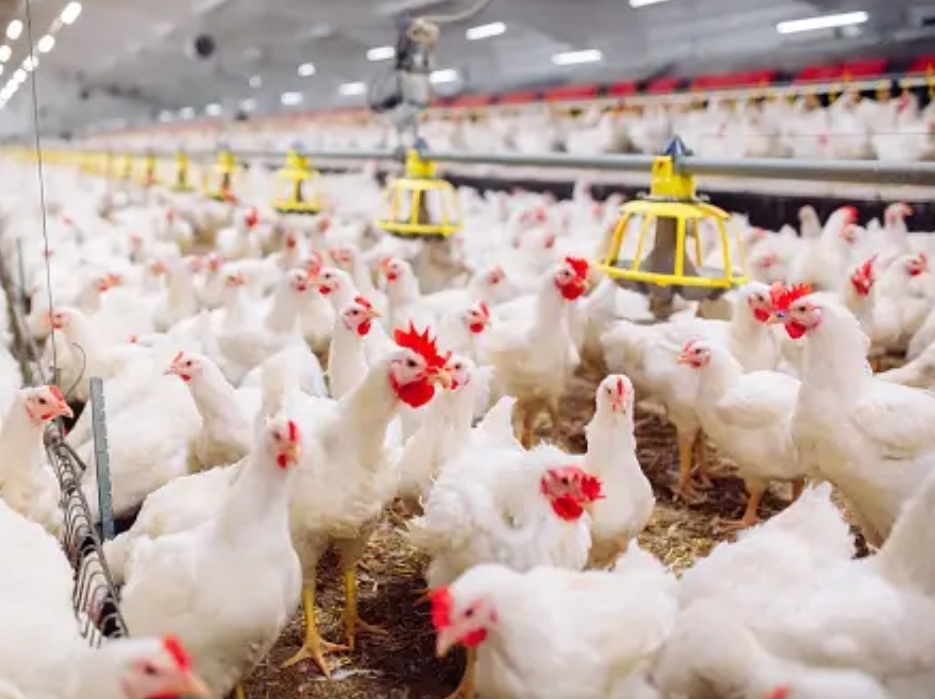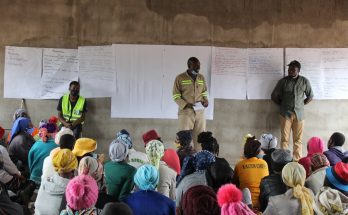
BEFORE her damascene moment in poultry care, Christine Muunganirwa, a 50 year old woman in Kambarami Village in Ward Murehwa district suffered significant losses. Whenever the chicks fell ill, whether it was a cough, or oddly coloured stool, she rushed to administer some Amoxicillin tablets. Amoxicillin is the most abused antibiotic not only in human health but also poultry.
To rationalize the use of antimicrobials in chickens, some nifty poultry farmers in Murehwa district have resorted to using traditional herbal medicines in lieu of antibiotics. Broiler farming is a delicate business with the caring of these chickens requiring extra care.
“In this poultry business. Before the farmers field school on poultry farming business, we would rear our chickens but they would die. There were times when the chicks got sick, we would give them our Amoxyl,” she told this publication on the sidelines of the Africa World Antimicrobial Awareness Week recently held in Zimbabwe.
The Food and Agriculture Organization of the United Nations (FAO) has been working with Zimbabwe’s agriculture ministry alongside its Agriculture Extension Officers, the Veterinary Department in various districts across the country such as Mutare, Masvingo, Murehwa to mention but these in what are known as Farmer Field Schools. The school started in Murehwa in 2021.
At these Farmer field schools, poultry farmers were taught about the prudent care of their chickens to minimize or eliminate antimicrobial resistance. This was through using alternatives to antimicrobials when treating the animals or humans such as probiotics or traditional medicines. Antimicrobial resistance is when a patient or animal or plants are not responding to locally available medicines due to their overuse, or misuse.
“Amongst the lessons was that a poultry farmer can start the rearing as one day old chicks up till they are six weeks old without it falling sick, without using antimicrobials using clean water, proper bedding and warm water for the cold. If the chicks get too much heat, they can get sick again. So we grateful for this program because it taught us a lot of things.
“At the moment I have five week old chicks and I haven’t given them any antibiotics. I keep the chicks well, changing of bedding, guarding against mosquitos. I have strict rules for those who want to enter into the fowl-run. If someone wants a chicken they just point at it instead of entering. We even use a tree called Mutiti. “If the chicken is having reddish or greenish stool, we crash some elements of the Mutiti tree and put it in water and the stool gets back to normal. So we are grateful that we don’t have to buy and use some of these medicines. We even use chilli for the sticky stool on the anus and after using this tree, the problem goes,” Ms Muunganirwa said.
Mr Alfons Vambe from Musoni village ward 10 in Murehwa aged 60 said they were 25. They had a roaster for the caring of the broiler chickens. Their agriculture extension officer Mrs Amanda gave them lessons on footbaths, which is an infection prevention control measure where the mat is placed at the entrance of the fowl run. He spoke of the need to have charcoal heaters, and appropriate feeding schedules for the chickens.
“What is discouraged as we are speaking about antimicrobial resistance an antimicrobial use is that whenever the broiler gets sick, you give it some antibiotics.
“We would go to the vet shop for this medicine called bremamet. It is a 14-in-1 medication meaning it treats 14 diseases for chicks. This is what we used occasionally. You see we have those road runner chickens, which we treated using our traditional medicines such as aloe vera also used for road-runner chickens.
“As for me I recommend prescribed medications in correct doses as well as consulting the veterinary officers who guide us on the proper doses and timelines,” he said.
In Ward 10 Murehwa, FAO started the training of 25 poultry farmers alongside the agricultural extension officers such as Mrs Amanda Gwangwadze.
“From out of the 25 participants, we have only two dropouts. These dropouts were those without passion for poultry farming. The farmer field school assisted us with 100 birds and eight bags and eight bags. As Agriculture extension officers, we did weekly trainings where we introduced special topics on AMR,” she said.
Dr Tinashe Hodobo the One Health focal person for Animal Health, said noted that the high demand for poultry products has resulted in intensified production with some cases having high usage of antimicrobials leading to antimicrobial resistance.
“So under this value chain, we have been looking at alternatives with the use antimicrobials. Things like biosecurity measures where you have a series of measures aimed at preventing the entrance of disease causing organisms in the production system.
“There are hygienic measures, and vaccinations are some of the alternatives and herbs you have highlighted.
“I also need to highlight that under the Medicines Control Authority of Zimbabwe, there is a committee on Complementary Medicines and it is well recognized that we can have other remedies besides the antibiotics and of course the due evaluation of such products is also required to evaluate the performance of these products and recommend for their use,” he said.
African Union Inter-African Bureau for Animal Resources (AU-IBAR) antimicrobial resistance expert Dr Joseph Magona commended poultry farmers for not only expressing interest in the reduced use of antibiotics but practicing what they were taught.
“I liked the initiatives of the farmers. They are very ready to learn and improve and with a lot of interest on what they were taught especially poultry production and the way they took up the message of how to avoid misuse of antibiotics in order to control the antibiotic resistance,” he said. “Including teaching the children, that was recommendable.”
On the use of alternatives in lieu of antibiotics, Dr Magona said the employment of biosecurity measures was important. “The vaccination is a way to reduce the use of antibiotics especially in tickbone disease. If you don’t vaccinate your cattle against January Disease, you are going to use a lot of antibiotics to save the animals, and that will lead to AMR. The other aspect in the poultry, they were using biosecurity measures to control infection
“That is highly recommendable. When you use biosecurity in poultry houses you also reduce on the consumption of antibiotics and that also reduces on the occurrence of AMR. And I am happy the people have embraced these alternative methods,” he said.
He also said while some traditional medicines have proved to be efficacious, they need more research.
“There are a number of alternatives, we call them ethno-veterinary. It can be very useful. We know a number of plants that are very effective on ticks. They are as good as conventional acaricides or pesticides.
“And one of the most common plant that I saw in the villages is lantana camara. The lantana camara leaves are highly efficacious against the ticks up to 95 percent. This is proven. But it needs more research and packaging on how to develop the dilution and more details about use. But more research could be done around the ethno-veterinary. They are good alternatives that can be used to reduce consumption of antibiotics,” the AU-IBAR official said.
Weighing in on Dr Magona’s observation of primary school going children displaying their knowledge on antimicrobial resistance through a play, AU-IBAR Communications expert Ms Fiona Imbali stated it was important to increase communication and education campaigns.
“Effective communication campaigns can drive behavioral changes among prescribers, patients, and healthcare and agricultural stakeholders. By highlighting the consequences of overuse and misuse of antimicrobials, we can motivate individuals to adopt more responsible practices, safeguarding the effectiveness of these critical medicines,” she said.
She added that multi-stakeholder collaboration was important in the fight against AMR.
“Tackling AMR requires a united global effort, and communication serves as a powerful tool for fostering collaboration and knowledge sharing among stakeholders. By working together, we can develop and implement effective communication strategies that address AMR at its root, ensuring a sustainable future for healthcare and agriculture,” Ms Imbali said.



